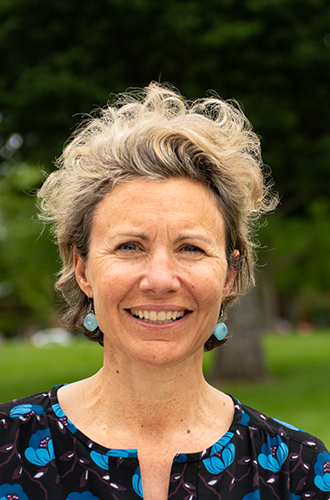Last month, the nonprofit Becoming Jackson Whole released the results of a local study with pretty remarkable results: A group of community leaders who participated in a mindfulness training program showed significant improvements in focus, productivity and overall mood. With May being Mental Health Awareness Month, KHOL spoke to three of the participants to learn more about the positive impacts of incorporating mindfulness into their daily lives.
Sue Mason was interested in how the human brain is wired before she participated in Becoming Jackson Whole’s first Mindfulness-Based Attention Training (MBAT) course in January 2020. But her understanding of mindfulness has evolved a lot since then.
“Before this, I was just like—I thought mindfulness honestly was kind of fluffy. It was kind of like, ‘Oh, it’s a luxury. It’s calming. It’s relaxing,’” Mason said. “And it’s not like that at all.”
Far from being luxurious, Mason said she’s learned that practicing mindfulness is actually really difficult.
“I would describe it as setting aside time to be intentional about the next 60 to 120 minutes of your day and really being present and really being focused,” she said

Dr. Amishi P. Jha, the science advisor to Becoming Jackson Whole, is the author of the forthcoming book “Peak Mind” (Oct. 2021, Harper Collins). (Courtesy of Dr. Amishi P. Jha)
Another way to think about it, according to Dr. Amishi P. Jha, is like a “mental pushup.” Jha is a professor of psychology in the Division of Cognitive and Behavioral Neuroscience at the University of Miami and the science advisor to Becoming Jackson Whole.
“Mindfulness is a form of cognitive or brain training. And just like any kind of training, we want to have exercises, we want to have ways to embed it into our day-to-day life,” Jha said. “But it ends up when we want to exercise the mind, it’s not going to look quite the same as obviously exercising the body.”
Jha said the whole point of mindfulness is to target what she describes as the “pain point of modern life:” the fact that our mind isn’t always where we want it to be. She also walked KHOL through a sample practice of how to work on that.
“Sit in a comfortable, alert, upright posture… feel free to close or lower your eyes and pay attention to the sensations of breathing. So, we pick a target object for the mind, for attention. And as we do this for a little bit, we’ll notice our mind will flit away, going to the past or future, anywhere but here and now.”
“When you notice your mind wandering,” Jha continued, “gently return it back to the present moment, to your breath-related sensations. And that is sort of the pushup. It’s to pay attention and focus, to notice the mind wandering and redirect.”
Jha recommends practicing that redirection for about 12-15 minutes a day in order to reap benefits like improved attention, productivity and leadership. It might sound too good to be true, but three course participants KHOL interviewed said they’ve noticed a bunch of positive changes since incorporating mindfulness into their lives.
Mason is the statewide director of stewardship for Climb Wyoming, a nonprofit that supports single moms through career training and job placement. She said her colleagues started noticing differences in her performance and demeanor at work after she completed the eight-hour MBAT course and started practicing mindfulness regularly.
“People were asking me like, ‘You’re just showing up so much calmer,’ or ‘Isn’t this bothering you?’ Things like that, you know, ‘Aren’t you bothered by this?’ And I was like, ‘I’m really not feeling it in my body,’” she said. “And now they’re like, ‘Can I come early?’ And they’re asking me to do a little guided practice [before meetings].”

Sgt. Tony Matthews plans to help promote the practice of mindfulness within the Jackson Police Department as an MBAT course facilitator. (Courtesy of Tony Matthews)
Tony Matthews is a sergeant with the Jackson Police Department. He said one of the most immediate benefits for him was that he started sleeping better after practicing mindfulness before bed. The exercises he learned have also helped him regulate his stress level at work.
“Police, law enforcement, those types of jobs, you have to amp yourself up all the time, you know, you’ve got the radio talking to you all the time. You have to be ready for everything,” Matthews said. “You’re in the elevated sense of awareness all the time. So, for me, it’s bringing that back home, focusing on myself, where I’m at, and bringing that down a little bit.”
Anna Olson, president and CEO of the Jackson Hole Chamber of Commerce, also went through the training. She said mindfulness is now something she expects to continue practicing for the rest of her life.
“It doesn’t solve everything. I still get stress, I still have anxiety at things, but it’s a tool that you can just go to when you need to. And it does help,” Olson said. “[I] have a habit to jump from the problem to the action. ‘How can I help? What can I do? What can we do? What are the goals?’ And very often mindfulness will say to you, ‘Just sit and listen.’ You don’t actually have to do anything right now.”

Anna Olson of the Jackson Hole Chamber of Commerce said cultivating a mindfulness practice doesn’t wholly eliminate stress and anxiety but is a powerful tool nonetheless. (Courtesy of Anna Olson)
Olson, Matthews and Mason all said they’ve been passing along some of what they learned to their colleagues and others whom they interact with at work. Matthews and Mason also took part in a follow-up “Train-the-Trainer” course, through which they’re now certified to officially teach the MBAT course themselves.
“I have a desire for our community and Jackson to be peculiar, so to speak,” Matthews said. “I want us to lead the way, not follow. To be an example to the rest of the country and world of what can work and what will work well, instead of following the trends of what everybody else is doing.”
Asked whether he thinks mindfulness practice should also be part of the larger national conversation about police reform, Matthews said he doesn’t see why not.
“I mean, there’s nothing but good coming out of it. It’s all positive, it’s all communication, thoughtfulness. It could definitely be a part of creating a positive police department if you don’t have that foundation to begin with, for sure. Absolutely.”
Bringing it back to the science, Dr. Jha said the Jackson study on the first cohort to take the MBAT course was unique because the participants were so diverse, whereas most of her lab’s past work and other studies have worked exclusively with one group of individuals, like veterans, military spouses or teachers.
“We already had a large literature that individually these different sectors of society can benefit. But no other community had ever tried to approach this from a community-based context,” Jha said.
That community-wide transformation was the brainchild of Sara Flitner, the president and founder of Becoming Jackson Whole and a former mayor of Jackson. She said she launched the organization in part to help foster a less divided and more civil community.
“When you build a collaborative problem-solving mechanism, when you bring stakeholders from different vantage points together over a common problem or to learn a common thing, there is something really uniting and powerful about that,” Flitner said. “We all see what happens when we stay locked in our bubbles and behind our computer screens, engaging only with people who are just like us.”
In other words, Flitner hopes to get Jackson Hole residents out of their comfort zones and engaging with each other more. The next opportunity for folks interested in trying that out her way will be coming this fall with another MBAT course open to about 50 members of the general public.
Becoming Jackson Whole also hosts free 10-minute practices on Zoom every Friday morning at 8 a.m. MST.





